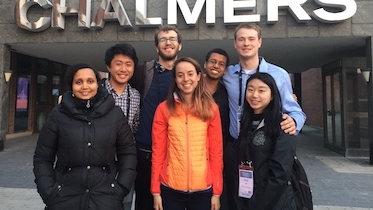
- About
- Consultation
- Programs
- Resources
- News & Events
Back to Top Nav
Back to Top Nav
Back to Top Nav

Last week, six Dartmouth students traveled to Gothenburg, Sweden to compete against 17 countries from around the world in the 9th edition of the International Physicists’ Tournament (IPT). In the months leading up to the competition, teams worked on solutions to seventeen open physics problems. Dartmouth undergraduates Sam Greydanus ’17, Margaret Lane ’17, Jack Neustadt ’17, Krishan Canzius ’18, Hang Qi ’18, and Christopher Yu ’19 formed the team representing the United States, with Sapna Shekhar GR acting as the team leader.
The seventeen problems spanned topics in physics from magnetism to thermodynamics. Some of the problems included estimating the height of a popcorn kernel from the sound of its pop and exploring why fluorescent lamps flicker.
The Dartmouth team was the first US team to qualify for the international competition. In the tournament, teams face off against each other in “physics fights.” The rules are simple: challenge a team on a problem, they present their results, you critique their solution, and a third team reviews the battle. This captures the essence of scientific research. While results matter, the way you present and discuss them is also important. The IPT format has gained momentum in top European schools such as France’s Ecole Polytechnique (EPF) and Sweden’s Royal Institute of Technology (KTH) where preparation for the competition is part of coursework.

The tournament offered a unique opportunity for students to explore their passion for science outside of the classroom. “I was excited about working on these problems,” explains Sam Greydanus ’17. “There are no easy solutions. I learned that you can only really understand a concept if you can apply it to the real world creatively, and that’s what IPT is about. Working on this self-driven project has taught me to act like a researcher in how I solve problems and explain them to others.”
IPT was also a chance for the Dartmouth students to form friendships with the best physics students from around the world. “Although it was a competition, the other teams were very supportive and we made friends easily,” noted Margaret Lane ‘17, “It was interesting to see the similarities and differences between teams in their approaches to the problems. And it was a great way for us to learn from some really impressive presentations. In particular, the Italian team was very friendly and we bonded with them. I’m glad to have these connections around the world for graduate school and beyond.”
Despite many late nights during their week in Sweden, the Dartmouth students ended IPT 2017 already looking forward to next year. “Having seen how the tournament works, I think we can send a very competitive team next year,” said Krishan Canzius ‘18. The team placed 15th and hopes to improve upon that ranking.
Dartmouth funded the trip with a generous grant from the Student Experiential Learning Fund (SELF), part of DCAL's Experiential Learning Initiative. Participating in IPT is one of many emerging opportunities for Dartmouth students to engage in academics outside of the classroom.